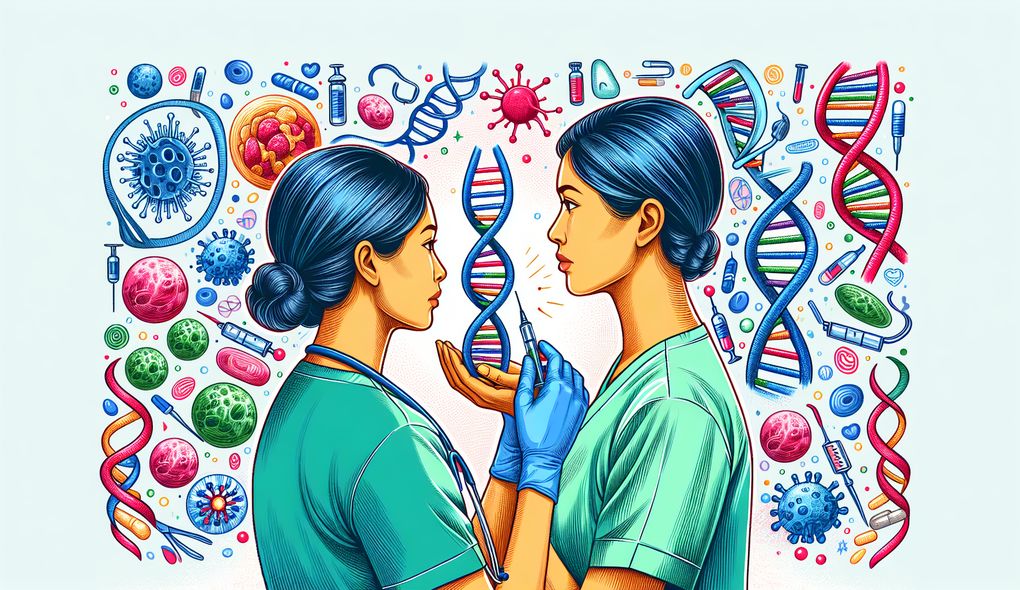How would you approach a patient who is resistant to genetic testing?
SENIOR LEVEL

Sample answer to the question:
If a patient is resistant to genetic testing, I would approach them with empathy and understanding. I would start by explaining the importance of genetic testing and how it can provide valuable information about their health and potential risks. I would listen to their concerns and address any misconceptions they may have. I would also emphasize that genetic testing is voluntary and that they have the right to choose whether or not to proceed. If the patient is still resistant, I would explore alternative options and provide them with resources and support to help them make an informed decision.
Here is a more solid answer:
When faced with a patient who is resistant to genetic testing, I would utilize my in-depth knowledge of human genetics and genomics to educate and discuss the importance of genetic testing in a clear and understandable manner. I would start by empathizing with the patient's concerns and addressing any misconceptions they may have. I would explain how genetic testing can provide valuable information about their health and potential risks, allowing for personalized patient care. I would emphasize that genetic testing is voluntary and that their autonomy and preferences are respected. If the patient remains resistant, I would explore alternative options and offer additional resources and support to facilitate their decision-making process. Throughout this process, I would collaborate with a multidisciplinary healthcare team to ensure comprehensive and coordinated care for the patient.
Why is this a more solid answer?
The solid answer demonstrates a more comprehensive approach to dealing with a resistant patient. It includes specific details about how the candidate would utilize their knowledge of human genetics and genomics, as well as their communication and counseling skills, to address the patient's concerns and provide education. The answer also highlights the candidate's ability to work collaboratively with a multidisciplinary healthcare team. However, it could be further improved by providing examples or anecdotes from the candidate's past experiences.
An example of a exceptional answer:
In approaching a patient who is resistant to genetic testing, I would rely on my in-depth knowledge of human genetics and genomics to tailor my approach based on the specific reasons for their resistance. I would start by actively listening to the patient's concerns and validating their emotions, ensuring they feel heard and understood. I would then address their specific concerns one by one, providing clear and evidence-based explanations to dispel any misconceptions or fears they may have. In addition to explaining the potential benefits of genetic testing, I would also discuss the limitations and potential risks, ensuring the patient is fully informed and empowered to make an educated decision. If the patient continues to be resistant, I would explore the underlying reasons for their resistance, such as cultural or personal beliefs, and adapt my approach accordingly. I would offer alternative options, such as genetic counseling or involving a trusted family member or support person in the decision-making process. Throughout this process, I would collaborate with a multidisciplinary healthcare team, including genetic counselors, physicians, and other specialists, to ensure the patient receives comprehensive and individualized care. By approaching the patient with empathy, understanding, and a tailored approach, I aim to build trust and support the patient in making an informed decision that aligns with their values and preferences.
Why is this an exceptional answer?
The exceptional answer demonstrates a highly empathetic and tailored approach to dealing with a resistant patient. It showcases the candidate's ability to actively listen, validate emotions, and address specific concerns with clear and evidence-based explanations. The answer also highlights the candidate's adaptability in understanding and respecting cultural or personal beliefs that may contribute to resistance. Furthermore, the answer emphasizes the importance of collaboration with a multidisciplinary healthcare team to ensure comprehensive care. The only area for improvement would be to provide more specific examples from the candidate's past experiences to further illustrate their capabilities.
How to prepare for this question:
- Familiarize yourself with the latest advancements in human genetics and genomics, including the benefits, limitations, and potential risks of genetic testing.
- Develop strong communication and counseling skills, particularly in discussing complex genetic information in a clear and understandable manner.
- Practice active listening and empathy to ensure patients feel heard and understood.
- Research and familiarize yourself with alternative options to genetic testing, such as genetic counseling or involving support persons in the decision-making process.
- Reflect on past experiences where you have successfully addressed patient resistance or concerns, and be prepared to share those examples during the interview.
What are interviewers evaluating with this question?
- In-depth knowledge of human genetics and genomics
- Excellent communication and counseling skills
- Ability to discuss complex genetic information
- Compassion and empathy towards patients
- Ability to work collaboratively with a multidisciplinary healthcare team

